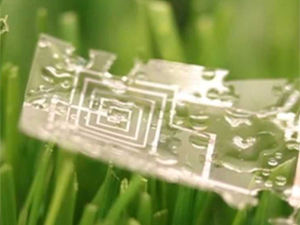



Date:05/09/17
 Chinese and U.S. researchers said Friday they designed a new form of electronic devices that can degrade and physically disappear when they absorb moisture in the air.
Chinese and U.S. researchers said Friday they designed a new form of electronic devices that can degrade and physically disappear when they absorb moisture in the air.
Such devices, known as transient electronics, could have a wide range of applications, from eco-friendly disposable electronics and sensors to weapons and explosives that function only temporarily, according to their study published in the U.S. journal Science Advances.
"Most of the transient processes reported so far only occur in aqueous solutions or biofluids," co-corresponding author Hangxun Xu, professor of the University of Science and Technology of China, told Xinhua. "The degradation of our transient electronics is triggered by water molecules in the environment, which is more controllable."
The trick in creating moisture-triggered transient devices was in integrating electronic components onto a film made of the degradable polymer polyanhydride, Xu said.
The devices can maintain stable operation until moisture in the air initiated a process called hydrolysis, which activated corrosive organic acids to digest all electronic elements, including metal electrodes, metal oxide dielectrics and semiconductors, he said.
What's more important, the lifetime of the devices can be precisely controlled by varying humidity levels in the surrounding environment or by changing their compositions, said Xu.
"The transience time scale can be tuned from a few days to several weeks, or longer, if needed," he said.
In order to illustrate the concept and verify the feasibility of this design strategy, various transient devices, ranging from passive electronics such as antenna, resistor and capacitor to active electronics such as transistor, diodes, optoelectronics and memories have been developed.
"We expect that this triggered transient mode can be applicable for temporal medical implants, disposable environmental sensors, data-secure hardware systems and moisture detection devices in the future," Xu said.
The study was jointly led by Assistant Professor Cunjiang Yu of the University of Houston, and also included Professor Xue Feng of Tsinghua University in China.
Chinese, U.S. scientists create electronics that degrade in air moisture
 Chinese and U.S. researchers said Friday they designed a new form of electronic devices that can degrade and physically disappear when they absorb moisture in the air.
Chinese and U.S. researchers said Friday they designed a new form of electronic devices that can degrade and physically disappear when they absorb moisture in the air.Such devices, known as transient electronics, could have a wide range of applications, from eco-friendly disposable electronics and sensors to weapons and explosives that function only temporarily, according to their study published in the U.S. journal Science Advances.
"Most of the transient processes reported so far only occur in aqueous solutions or biofluids," co-corresponding author Hangxun Xu, professor of the University of Science and Technology of China, told Xinhua. "The degradation of our transient electronics is triggered by water molecules in the environment, which is more controllable."
The trick in creating moisture-triggered transient devices was in integrating electronic components onto a film made of the degradable polymer polyanhydride, Xu said.
The devices can maintain stable operation until moisture in the air initiated a process called hydrolysis, which activated corrosive organic acids to digest all electronic elements, including metal electrodes, metal oxide dielectrics and semiconductors, he said.
What's more important, the lifetime of the devices can be precisely controlled by varying humidity levels in the surrounding environment or by changing their compositions, said Xu.
"The transience time scale can be tuned from a few days to several weeks, or longer, if needed," he said.
In order to illustrate the concept and verify the feasibility of this design strategy, various transient devices, ranging from passive electronics such as antenna, resistor and capacitor to active electronics such as transistor, diodes, optoelectronics and memories have been developed.
"We expect that this triggered transient mode can be applicable for temporal medical implants, disposable environmental sensors, data-secure hardware systems and moisture detection devices in the future," Xu said.
The study was jointly led by Assistant Professor Cunjiang Yu of the University of Houston, and also included Professor Xue Feng of Tsinghua University in China.
Views: 475
©ictnews.az. All rights reserved.Similar news
- The mobile sector continues its lead
- Facebook counted 600 million active users
- Cell phone testing laboratory is planned to be built in Azerbaijan
- Tablets and riders outfitted quickly with 3G/4G modems
- The number of digital TV channels will double to 24 units
- Tax proposal in China gets massive online feedback
- Malaysia to implement biometric system at all entry points
- Korea to build Green Technology Centre
- Cisco Poised to Help China Keep an Eye on Its Citizens
- 3G speed in Azerbaijan is higher than in UK
- Government of Canada Announces Investment in Green Innovation for Canada
- Electric cars in Azerbaijan
- Dominican Republic Govt Issues Cashless Benefits
- Spain raises €1.65bn from spectrum auction
- Camden Council boosts mobile security





















